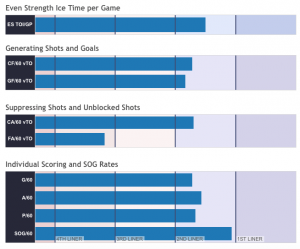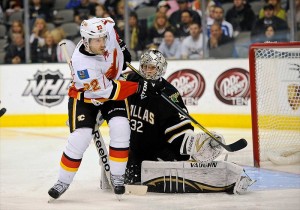A third straight season of quarterfinal futility may finally be ushering in wholesale changes for the St. Louis Blues. In the team’s six games against the Minnesota Wild, a one game outburst of six goals was an outlier as the Blues offense stagnated greatly. Vladimir Tarasenko virtually became the squad’s only source of points, as his six goals accounted for almost half of their 14 tallies through the series.
This comes despite the fact that the team has consistently ranked among the league’s very best offenses. For General Manager Doug Armstrong, this will mean taking the offseason to trim the fat and make the proper additions so that the team can push past the hurdle that has stymied the fantastic potential of this franchise.
The Treacherous Road Ahead
Difficult decisions, such as the possible removal of T.J. Oshie, will sting the fans, but ultimately leave the team with a lot more cap space to fill the space with quality depth talent. While Oshie is a fan favorite, his much-discussed lack of postseason production and hefty contract ($4.175 million cap hit through the 2016-2017 season) make him ripe for moving.

However, Oshie is not the only player coming up short in the playoffs. David Backes, the team’s captain, has had enormous difficulty translating his talented game into playoff production. His unimpeachable regular season game simply disappears when the postseason comes about. 2014-2015 was, statistically, his second-best regular reason. However, his disappointing six games against the Wild were a huge factor behind the team’s disappointment.
Meanwhile, Patrik Berglund has floundering in much the same way. The 26-year-old center has been unable to even crack the 40 point mark since his 52 point high mark during the 2010-2011 season. And while he tallied two goals and two assists for a total of four points this postseason and had seven points during the 2011-2012 season, he has generally disappointed. His other three trips to the playoffs have, combined, resulted in a total of two points.
With so many players finding their heads potentially headed for the chopping block, Armstrong will need to repopulate the roster with cheap, quality talent to build a deep roster capable of vaulting its opponents in the postseason. Some of this can be done through calling up exciting prospects such as Ivan Barbashev, but a Stanley Cup worthy team typically needs at least a handful of established players and, if they have a scoring touch to boot, it certainly does not hurt.
The Solution

For St. Louis, this potential fit can be found in their old friend, Lee Stempniak. The 32-year-old winger came up with the Blues during the 2005-2006 season, where he established himself as a model for consistency at the position. He was eventually traded to Toronto in November 2008, but has continued to perform at high-level, averaging 43 points a season and almost 16 minutes of ice time per game.
While this past season, in which his time was split between the New York Rangers and the Winnipeg Jets, featured Stempniak’s lowest offensive output since 2011-2012, when he played ten fewer games, he is still a bargain buy for any franchise in need of solid depth forward. His contract for the past season only paid him $900,000 and, as he hits the market and looks for another deal, he will likely get one of a similar price and length.
However, one look at his HERO chart, courtesy of Own The Puck, quickly reveals that Stempniak would make himself a deceptively great sign.

His advanced statistics show that this forward, generally regarded as a depth sign who has been relegated to the third and fourth lines over the past few seasons, has been playing up the abilities of a second or third liner.
While his Fenwick Against leaves something to be desired, he more than makes up for it with his Corsi Against. He is clearly a quality shot blocker and is more than capable of providing the kind of suppression that is needed of a bottom-six forward.
But it is his offensive output that will make him such a desirable target for any team, especially the Blues. While he may not be able to post seasons of 40 points anymore, a consistent output of around 25 to 30 points makes him an excellent third or fourth liner. Additionally, his HERO chart indicates that he is able to possess the puck and make shots on goal at a rate well beyond his role.
If St. Louis can shed the contracts of Oshie, Backes, and Berglund, immediately resulting in an additional $12.375 million in cap space, the team will have the ability to fill the roster with a number top-quality players who cost substantially less. This will also permit the team to try and resolve their poor depth scoring, giving themselves the tools to try and make a deeper playoff push. And even though they would have the money to negotiate with several big-ticket free agents if this is to happen, sometimes it is best to play the numbers and look for the bargain choices.

This is particularly useful for the almost inevitable scenario in which the Blues are not afforded more than $12 million in space. And so even if the team is afforded a significantly more stringent budget from which to work, Stempniak would be a worthy sign. His skill set places him well above most of the other players that teams could acquire for the same role and the same money. His veteran presence would also be more than welcome on a roster that has sorely lacked leadership. Finally, Stempniak’s return to St. Louis would also bring his career full-circle, which could make the possibility of it occurring all the more likely.
While it is far from a guarantee that he will end up in the Gateway to the West, but it would certainly behoove Doug Armstrong and the rest of the St. Louis Blues to pay extra special attention to Stempniak when the free agency window opens. He could end up being a significant part of the formula that helps the team make that extra push into the playoffs in 2016.